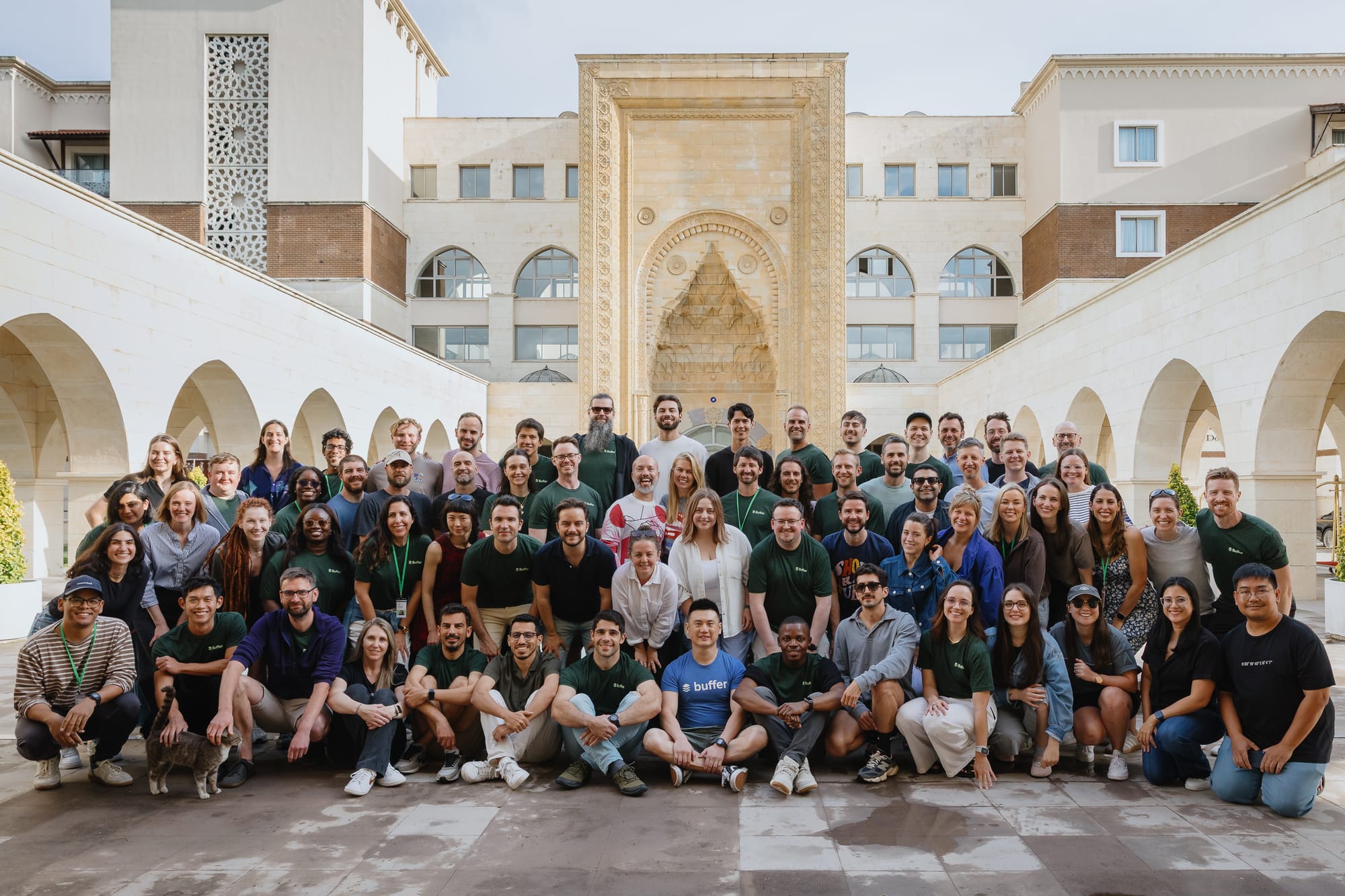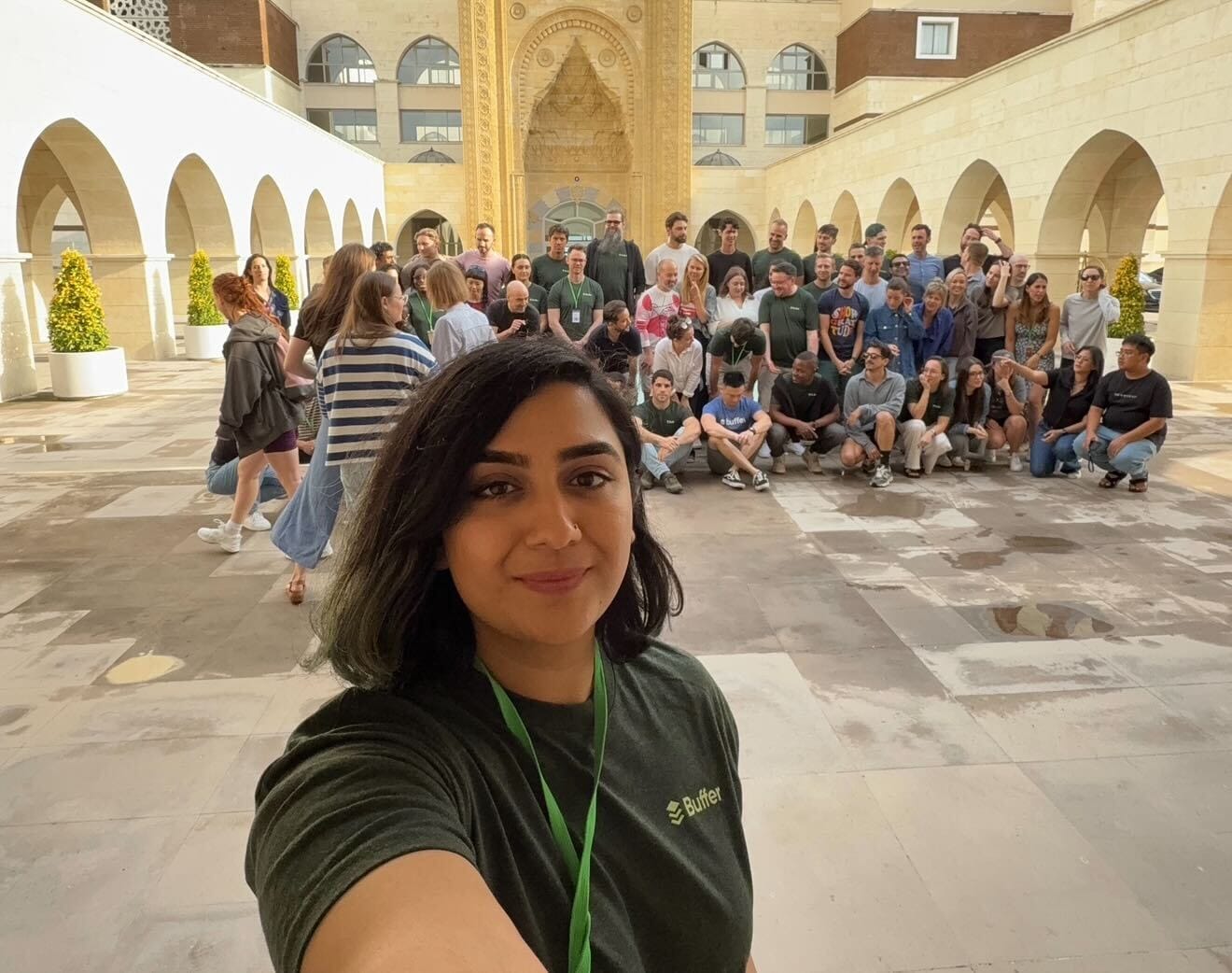
The Science of Rest and Why One of Our Teams Had Summer Hours

Head of Communications & Content @ Buffer
There’s this powerful myth that exists in the working world: the more you work and less you rest, the more you will get done.
It turns out that our bodies and our brains don’t quite work that way. What’s surprising is that the opposite is in fact true.
If you rest more and work less, you’ll be more productive, healthy, and creative. Not to mention, one author believes more rest can positively impact climate change and gender equality — I’ll elaborate on all of that below.
We gave this a try at Buffer in the summer. Our Customer Advocacy team switched over to summer hours, didn’t work Friday afternoons, and instead were encouraged to go outside, spend time with family, or read.
Let’s look at the benefits of rest, how our summer hours went at Buffer, and what other companies do to encourage rest for their employees.


Instead of Working More, We Should All Rest More
I came across this incredible book recently called Rest: Why You Get More Done When You Work Less by Alex Soojung Kim. Fascinating title because I can bet that most of us would love to get more done and work less.
In this book, the author looked at the lives of scientists and writers and found people who were incredibly productive but only worked four or five hours a day. Instead of looking into how they worked, he took another route and dug into how they rested during the 20 hours of the day when they weren’t working.
What he found was slightly counterintuitive, which explains why it isn’t something we all do. He found that the best type of rest for restoring energy is active rest. Examples of active rest are exercise, walks, or engaging hobbies.
That’s not to say that you can never lie in bed to rest again, it’s just that this active rest is going to deliver the greatest benefits. Let’s dive into a few of those benefits that are particularly powerful and influential in our work lives, plus a few that affect the world on a global scale.
Rest makes you more productive
Overwork, Soojung Kim writes, is “something that can be sustained for periods of a few weeks, but after that you start creating more problems than you solve.”
In the same article, he also outlines how no matter what kind of work you are doing, if you are human, overwork will negatively impact productivity.
Instead of overworking yourself, he recommends something like going for a walk. The positive effect that a 20-minute walk in your day can have on your brain is astounding. As soon as you start exercising, endorphins are released, as well as a protein called BDNF (Brain-Derived Neurotrophic Factor). The BDNF protects and repairs your memory neurons as you exercise. This is why we feel so at ease after exercising and why our memories are so clear.

Rest makes you more creative
Plenty of researchers in neuroscience have done fascinating studies on the effects of work and rest on your brain and your productivity.
According to neuroscience, the active rest that Soojung Kim is talking about helps people be more creative. One study showed that active rest like pursuing a hobby, sport, or anything else where you are moving instead of sitting, boosts creativity.
That’s because “the parts of your brain that drive creativity are most active when you don’t have to focus.”
On the flip side, overwork makes your brain less sharp; scientists found that moments of creativity take place when the mind is at rest rather than working.
Rest helps with your health
When we work more, we’re likely to sleep less, pay less attention to what we eat, and skip exercise. This combination, it comes as no surprise, leads to a whole span of health issues.
Research from over 50 years has shown that overworking leads to “obesity, heart disease, burnout, and shorter lifespans.” Another study determined a clear link between overwork and impaired sleep and depressive symptoms.
By contrast, the health benefits of getting outside and taking a walk away from a screen and out of the sitting position, and sleeping a healthy amount are endless. Sleep itself, which is what many of us associate with rest, is one of the best things you can do for yourself:
According to the Harvard Medical School, sleep plays a critical role in:
- immune function
- metabolism
- memory; and
- learning
And health.com lists even more benefits including:
- A longer life
- Decreased inflammation
- Increased creativity
- Increased energy and stamina
- Sharpened attention span
- Healthier body weight
- Lower stress
- Decreased risk of getting into accidents
- Decreased risk of depression
Health issues are something that employers should be aware of as well, because in the long run employees are more productive if they aren’t suffering from the negative impact of overwork, plus it makes for a happier company environment.
More rest could solve some pretty major world problems like climate change and gender equality
It sounds a little crazy to say that if we all work less, we might help with climate change and improve gender equality, but according to historian and author Rutger Bregman, it’s entirely possible.
Let’s say we went so far as to have a shorter workweek. A shorter workweek isn’t a new idea, and it’s been done before, by Henry Ford. It was Ford who took the six-day workweek to five days instead.
Research shows that a shorter work week could cut the CO2 we emit in half. Bregman found that “Countries with a shorter work week have a smaller ecological footprint. Consuming less starts with working less — or, better yet, with consuming our prosperity in the form of leisure.”
When it comes to gender equality, countries that have adopted a shorter workweek already consistently top gender equality rankings. Bregman says it’s about having an equitable distribution of work and having paternity leave is crucial here. He gives Sweden as a great example:
Nowhere is the time gap between men and women smaller than in Sweden, a country with a truly decent system in place for childcare and paternity leave. And paternity leave, in particular, is crucial: Men who spend a few weeks at home after the birth of a child devote more time to their wives, to their children, and to the stove than they would have otherwise.

An Experiment with Summer Hours at Buffer on the Team You’d Least Expect It

Photo Todd Balsley
We had a chance to experiment with more rest at Buffer recently. Inspired by how Basecamp has summer hours, our Customer Advocacy team decided to take Friday afternoons off all summer.
What’s impressive about this team taking time off is that since they are customer-facing and constantly in contact with customers, they are in theory the most difficult team to give reduced hours to without negatively impacting the email inbox.
Despite this, there were no issues that stopped the team from taking time off and required them to work Friday afternoons all summer, and the experiment was all around a huge success.
Many teammates took the extended weekends to leave early for a cottage, spend more time with family, or go outside to a park or anywhere away from a laptop. There’s already been great feedback on how rejuvenating that time was for the Advocacy team, and it’s in the plans to continue summer hours next year, too.
Now that summer hours are over, the team isn’t quite back to business as usual. Friday afternoons are currently reserved for personal development time where each person on the Customer Advocacy team works on something they’re looking to improve, and they set goals with their team lead to stay on track.
That means that this team who is one of the least likely to spend less time working (because we’re always getting more emails from customers) have cut their week slightly shorter with no end in sight. They are still on track as a team and reduced working hours haven’t negatively impacted them. If anything, they’re all more refreshed and motivated going into the work week after a Friday afternoon of either time with family or self-improvement.

How 3 Other Companies and 1 Country Encourage Less Work and More Rest
Henry Ford famously said, “It is high time to rid ourselves of the notion that leisure for workmen is either ‘lost time’ or a class privilege.”
And Ford isn’t the only company that decided that having employees work less was better for the company, but they were one of the more influential companies in history.

Today, many other companies follow suit. Basecamp limits emailing in the evening, and in the summer only works four days a week.
As you might expect, FitBit is another company that encourages plenty of movement from employees during the day. They even have a division within FitBit that helps other companies to create rewards programs for employees who are active.
Companies aren’t the only ones putting employee health first, one country is also following suit.
In 2015, France passed a labor reform bill suggesting that companies with more than 50 employees limit work happening after work hours. They added language for digital technology, in particular, meaning that employees shouldn’t be emailing or messaging on Slack after work hours.

3 Other Ways To Encourage Rest
Here are a few other ways we’re trying to sneak more rest into our schedules at Buffer that you’re welcome to grab and apply at your company, too.
1. Set rules for communication
We recently published our 10 Slack Agreements at Buffer that help our employees know that it’s okay to shut Slack down and not be online all the time.
Our Engineering team also practices deep work Wednesdays where they aren’t on Slack all day on Wednesday so they can focus on creating.
2. Make vacations a priority
Vacation time is a great source of rest, but even with unlimited vacation we didn’t have people taking time off. Instead, we switched to minimum vacation with far better results.
Our leadership team also prioritizes vacation time to set a healthy example for the rest of the company.
3. Shut the company down sometimes
This past year was the first time Buffer closed down over the holidays. On the 25th of December and the 1st of January, we made sure no one at Buffer was online. It was highly unlikely that we’d have customers online those days, so it made lots of sense for us to rest up as well.
This one might be less feasible for some types of companies, but it’s fun to consider small ways to try and implement less work even if the company can’t close up completely.

Over to You
Have you rested today? What are some of the ways that you add more rest to your life?
Let us know in the comments!
Cover photo by Spring Fed Images
Try Buffer for free
180,000+ creators, small businesses, and marketers use Buffer to grow their audiences every month.
Related Articles

We've been hosting Retreats at Buffer for 12+ years. In this article, we've detailed everything we've learned from 14 Retreats.

I recently attended my first in-person, international conference. Here's what I learned.

What it was like to join a fully remote team like Buffer, and how going on the company retreat so early on helped shape my journey in ways I hadn’t imagined.